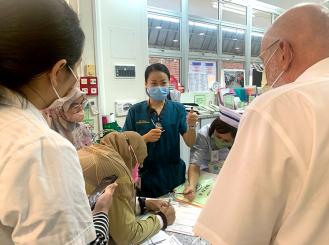Jul 18, 2023
By Katherine H. Crawford, MA, PMP, ASCO Communications
This spring, a new institution was welcomed into the ASCO International Cancer Corps (ICC), a multiyear quality improvement program. The Instituto Oncológico del Oriente Boliviano in Santa Cruz, Bolivia, was selected through a competitive application and review process by the ASCO Latin America Regional Council.
Participating in the ICC “is important because it will strengthen the current capacities of the hospital,” said Diego Mauricio Montenegro Velasco, MD, MSc, an oncologist and ICC program coordinator at Instituto Oncológico del Oriente Boliviano. These changes include “a permanent update of human resources by exchanging knowledge and experiences through forums, internships, telemedicine, and virtual tumor committees; technical assistance and cooperation between countries; technology transfer, especially in the area of computers; and developing our clinical research capacity, which is very important to start a research school and generate a research culture. All of these changes will allow a restructuring of the organization of the entire hospital with a modern, scientific teaching and research oncology vision,” he said.
The ASCO ICC program is designed to improve the quality of cancer care at medical institutions in low- and middle-income countries through oncology training to clinical staff. Training is provided by ASCO volunteers serving as faculty and mentors for various educational programs and in-person hospital visits over the course of several years.
“The goal of the ICC is to establish formal relationships with select institutions around the world,” explained Vanessa Eaton, director of international education at ASCO. “The aim is to meet the learning needs established by ICC institution partners through short-term volunteer visits and other ASCO educational programs.”
Education is the primary component of the ICC. “ASCO has a growing portfolio of educational programs that include quality-of-care initiatives, training in palliative care, and multidisciplinary cancer management of common tumor types,” said Ms. Eaton. “We work with each of our ICC partners to match our programs to their educational needs. Once the objectives are clear, we pair volunteers to provide the required expertise and coordinate activities such as courses, virtual trainings, and in-person visits.”
The Instituto Oncológico del Oriente Boliviano has requested that its ICC activities focus on palliative care training as a first step. Courses will be aimed at a generalized audience and center on the importance of integrating palliative care into health care systems and destigmatizing the use of opioids. ASCO also will develop a specialized online course for physicians and oncology staff that delves more deeply into palliative care for patients with cancer.
“We want to be able to help the entire country, to be able to generate health policies that improve accessibility to adequate oncologic treatments, promote the continuous training of all personnel, and generate necessary changes so that our patients can have the best possible survival with a good quality of life,” said Dr. Montenegro.
For more than 10 years, ASCO has conducted in-person palliative care courses in collaboration with societies and institutions outside of the United States. “Our success has been demonstrated through our evaluation process,” Ms. Eaton said. “Participants at these in-person courses reported improving their skills to manage pain and symptoms of advanced cancer, as well as to communicate more effectively with patients and families.”
In recent years, this program expanded to a virtual format led by ASCO volunteer Frank D. Ferris, MD, FAAHPM, FAACE, FASCO, executive director of palliative medicine research and education at OhioHealth. It was piloted in collaboration with another ICC partner, Sarawak General Hospital (SGH) in Sarawak, Malaysia. One of SGH’s goals in being an ICC site was to improve their hospice and palliative care services. Outcomes from the virtual program are just as promising as the in-person Palliative Care Courses. Once travel resumed as pandemic restrictions eased, Dr. Ferris led in-person bedside trainings that built upon the skills taught during the virtual courses. Through this multipronged approach of virtual and in-person trainings over the course of a few years, ASCO and SGH hope to achieve lasting change to palliative care service delivery in Sarawak.
In addition, SGH has hosted ASCO Project Malaysia, with virtual monthly sessions on the topic of neuro-oncology, and will begin quality improvement projects.
SGH Malaysia is a model for the ICC program in other locations, and Instituto Oncológico del Oriente Boliviano is following suit with its dedication to improve palliative care service delivery by offering education and training through the ICC. This project is being led by ASCO volunteers Nicolas Dawidowicz, MD, and Sofia Bunge, MD, palliative care specialists from Argentina, who made an in-person visit to the institution in December 2022 to kick off the collaboration and learn more about the needs at the site. The activities also are supported by Dr. Ferris, incorporating lessons learned from trainings with SGH Malaysia.
Becoming an ICC Volunteer
For ASCO members, volunteering allows the opportunity to share their medical expertise and build long-term, supportive relationships with clinicians in other countries. Members interested in volunteering with ICC can submit an application at volunteer.asco.org to join the Volunteer Corps; ASCO staff review the applications and pair eligible oncology professionals with a medical center whose needs match the volunteer’s expertise. Volunteers then spend one to four weeks onsite training staff, residents, and students and gaining insight into the center’s cancer management needs and challenges.
Volunteers must be appropriately trained and credentialed medical professionals who specialize in oncology. This includes physicians (medical, radiation, and surgical oncologists, among other specialists), laboratory professionals, and nurses. Final-year oncology fellows will be accepted if paired with an experienced volunteer.
Members interested in learning more about volunteering for the ICC program can email international@asco.org.

